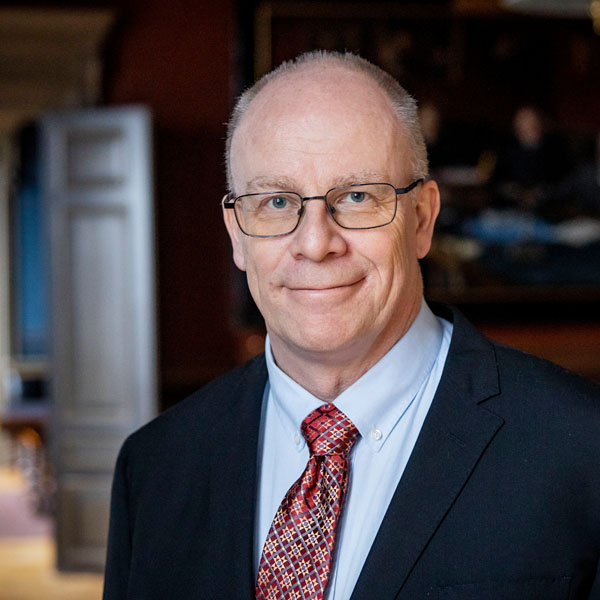I would like to say, personally, how fantastic it is to have a university with such a diversity of disciplines and expertise. This was actually what made it possible for me to start out in what became my life’s work. I had studied Egyptology with Rostislav Holthoer at Gustavianum. I knew our Egyptological collections contained thousands of mummies. At the Tandem Accelerator Lab, they were able to determine the age of my samples. I learned molecular biology at the Wallenberg Lab with Per Pettersson, who was at the forefront of the technologies that emerged in the 1980s. All this within fifteen minutes’ walk. This is what makes a full-scale university like this so unique, an environment that makes things possible that would otherwise have been impossible.
Svante Pääbo’s spontaneous vote of thanks at lunch in the Hall of State on the day of his lecture in the Grand Auditorium during Nobel Week has stayed in my mind ever since.
The unique environment he talks about, the way that everything is close at hand and that we can move from one world-leading research setting to another in a quarter of an hour, is quite incredible, after all. Svante Pääbo had the good sense to make the most of this, to bring together expertise from several different fields, which ultimately led to findings that changed our view and understanding of evolution.
Specialisation is important, but every specialisation, every centre of excellence and disciplinary niche, needs to reflect on its position in the wider context. Not all the time, but every now and then, we need to look up and look around.
It was in this spirit that we held a Vice-Chancellor’s seminar in the Humanities Theatre the other week. The seminar was led by Claes Fredrik Helgesson from the Centre for Integrated Research on Culture and Society (CIRCUS) and many good points came up. The panel consisted of Lisa Ekselius, Women’s Mental Health during the Reproductive Lifespan (WOMHER); Erik Melander, Alva Myrdal Centre for Nuclear Disarmament; Linda Wedlin, Democracy and Higher Education; and Linus Sandegren, Uppsala Antibiotic Center. Individually and in conversation, they raised their experiences and offered intelligent insights into ways of thinking along less discipline-bound lines and focusing more on the need to find solutions, irrespective of organisational affiliation. It was an exciting, inspiring, appetite-whetting seminar. Several participants even questioned the very possibility of working in any other way when the task is to tackle societal challenges. Warm thanks to everyone who took part. I personally will continue to think about obstacles hindering interdisciplinarity.
One such obstacle that was mentioned during the seminar and that several people have brought up is that we have an economic system characterised by inflexible funding and distribution of resources. This inflexibility affects both students who want to take a course that suits them better at another department, and researchers who need to be borrowed or participate in collaboration and who happen to work at another faculty.
How do we avoid excessive administration? What is required for departments to be able to benefit from collaboration on equal terms?
However, we are not the only ones who need to look up and look around. This applies to politics as well. It will soon be time for the research bill and time for us at the University to submit our input and views. We intend to continue to stress the importance of direct government funding. Funding and the right to set our own priorities are fundamental to academic freedom. In our submission we will criticise the compensation we receive for education (the ‘price tags’), which has been eroded to such an extent that we now cannot give students who are eager to learn enough face-to-face education. The educational factory is as lean as it can possibly be and this is not right – with respect to our students, our principles, or the future.
Here we need to explain that real knowledge and transmission of knowledge require time. The time may also have come to distinguish more clearly between the roles of different actors in higher education in Sweden. As a research university, we have a special role and function for those who want to continue from undergraduate to more advanced education. We must maintain this role.
I would also like to emphasise the cohesion of a university, the way in which the parts contribute to the whole.
At this juncture, it feels as if the prospects of a positive response are quite favourable. My impression when Minister for Education Mats Persson last visited us was that we seemed to agree about the importance of long-term basic research for creating knowledge about things we currently know nothing about at all.
It appears to me that we have a duty to clarify in our submission that Uppsala University, with its research and education, is a single entity. Small injections of targeted money are not really what we want. We face the task of enlightening the government about the University as a coherent whole and promoting awareness about our work and our outlook.
Like Pääbo, I consider that our strength lies in our open-doors approach to education. It is this that puts our University in a unique position to be fantastic. We must highlight this in our input to the research bill.

